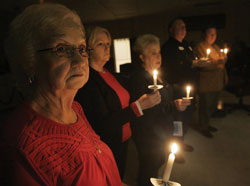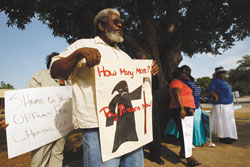The Next Chapter: Municipalities Are Using Chapter 9 to Fend Off Creditors

Jefferson County is wrestling with $3 billion in bond indebtedness left largely from an ambitious sewer system upgrade that was plagued by waste and corruption. If the Alabama state legislature rejects a proposed settlement, the state’s most populous county may be forced to file the largest municipal bankruptcy in history. Photo by AP Photo/Dave Martin.
Rex Wall was a firefighter and fire marshal in Prichard, Ala., for more than three decades. He always said he could have made more money in the private sector, but he loved being a fireman.
Plus the city offered comfortable pension benefits after only 30 years of consecutive service. The lower paychecks and the long hours were rewarded with the ability for him to retire in his late 50s. In addition, state law required Prichard to pay his pension.
“It’s not like the government can go bankrupt,” he jokingly told friends. “What could go wrong?”
In October 2009, Prichard’s pension fund went dry. The city stopped sending Wall and 143 other Prichard retirees their checks totaling $140,000 monthly.
Wall, then 62, was too young to qualify for Social Security and Medicare. Due to the recession, he wasn’t able to find a job. His feeble savings quickly evaporated. He fell into depression and became chronically ill.
Nine months later, Wall was found dead in his house. His electricity and gas had been turned off. The city shut off his water. Prescriptions for medications had gone unfilled for months.
“He was a proud man who refused to ask others for help,” says retired Prichard fire chief David Anders. “He deserved better.”
Before he died, Wall joined with Anders and retired Prichard police officers, firefighters, garbage collectors and other municipal workers in the winter of 2009 to file a class action against city leaders. The complaint said the retirees earned their pension by their decades of service to the town and demanded that the city give them the $2.7 million in pension benefits that had gone unpaid since October 2009.
The city of Prichard responded by filing federal Chapter 9 bankruptcy, claiming there was simply no money left to pay.
Lawyers representing the city said there were only two choices: Restructure and greatly reduce its pension obligations or simply go out of business as a government.

Friends and family held a candlelight vigil in Prichard in March for firefighter Rex Wall and 15 other retirees who died after the Alabama town suspended pension payments in 2009. Photo by The Press-Register, Mobile, Ala./John David Mercer
BANKRUPTCY’S BULLY
Legal and financial experts from the world of municipal bonds, public finance, government pension funds and municipal bankruptcy say that what happened in this Mobile suburb of 27,000 serves as a cautionary tale of what may become a more frequent occurrence across the country.
Chapter 9, which was created in 1934, in the heart of the Great Depression, is feared as the bullying stepbrother to its Chapter 11 sibling because of its unstructured nature and onerous potential.
Chapter 9 is a very different animal from its counterparts in the bankruptcy code. It provides bankruptcy protection only to municipalities in states that constitutionally provide for it, but offers deference to municipalities in choosing to file.
Municipalities cannot be forced into Chapter 9, nor under this section, can they be forced to liquidate assets. Bankruptcy judges have no ability to modify Chapter 9 plans; they may only approve or reject what is presented to them. Chapter 9 doesn’t provide protection for collective bargaining agreements or retiree benefit guarantees, though many state constitutions require that municipalities meet their pension requirements.
There is no similar provision allowing states to seek federal bankruptcy protection. But some politicians and legal scholars have called on Congress to consider creating a Chapter 17 for just that purpose.
It may be needed.
A 2010 study by Northwestern University’s Kellogg School of Management estimates that state governments have $3 trillion in unfunded employee pension fund liabilities and that local municipal governments have another $574 billion.
The study found that hundreds of governmental agencies—from small utility and school districts to large cities and even states—could run out of money from these unfunded retiree obligations in the next decade.
And some legal and financial experts predict that during the next decade, hundreds of these government entities will default on their pension commitments even though most state constitutions require them to pay retirees in full. As a result, many municipalities will seek federal bankruptcy protection as a means of escaping the debt.
This summer, the town of Central Falls, R.I., declared bankruptcy, saying that its pension fund will go dry this fall.
Even more significantly, officials in Jefferson County, Ala., recently negotiated a plan to rescue the county from default on $3 billion in bond debt. The plan relies heavily on increases in sewer fees for existing residential and business customers. However, it faces powerful opposition in the Alabama legislature. If the deal fails, it would force the largest municipal bankruptcy in U.S. history.
A study by the Pew Center on the States this year found that state pensions have been losing ground even faster the past three years. State pensions were 84 percent funded in 2008, but less than 75 percent funded in 2010, according to the study.
Pew found that states contributed less than two-thirds of the $115 billion that actuaries recommended in 2009 and 2010. The unfunded pension liabilities do not include hundreds of billions or possibly trillions of dollars in additional shortfalls facing cities, counties and states on health care costs for retirees. A recent study put that tab at $200 billion for local and state employees just in New York alone.
For nearly three decades, federal law has required private companies to report their pension obligations and collections to the Financial Accounting Standards Board. There is no such requirement for state and local governments.
“Trillions of dollars are at stake,” says University of Pennsylvania law professor and bankruptcy expert David Skeel. “California is the most troubled state, because its pensions are unfunded by more than $500 billion. New Jersey is not far behind.”
Skeel says small towns like Prichard are particularly vulnerable. “Their pension responsibilities as a percentage of their annual budgets are overwhelming and they have no means of generating additional revenues.
“The bond markets and those who invest in municipal bonds have every right to be concerned,” he says.
“When you look at the pension liability numbers, it is terrifying for governments, employees and possible creditors,” says Marc Levinson, a partner at Orrick, Herrington & Sutcliffe in Sacramento, Calif. “There’s a lot of money and a lot of people’s livelihoods at risk.”
Levinson represents Vallejo, Calif., a Bay Area city of 117,000 residents, in its ongoing bankruptcy case.
In August, U.S. Bankruptcy Judge Michael McManus gave final approval to Vallejo’s debt restructuring plan to emerge from bankruptcy after three long years. The plan calls for unsecured creditors to receive between a nickel and 20 cents on the dollar. Retirees’ pension payments remain untouched, but the city will cover only $300 a month of retirees’ health insurance premiums instead of the $1,500 it had been paying. The agreement leaves the city’s police and fire departments half the size they were in 2008, but Vallejo now has a balanced $65 million annual budget.

Protesters gathered in font of the Prichard municipal complex on behalf of unpaid city pensioners before a May city council meeting. The city later settled the pension dispute, enabling the Alabama town to avoid filing for Chapter 9 bankruptcy protection. Photo by The Press-Register, Mobile, Ala./John David Mercer
NO ONE SIZE FITS ALL
The Vallejo case has generated $10 million in legal fees. Orrick charged Vallejo its 2008 rates for the past three years of representation. Levinson billed the city $650 an hour instead of his regular $770 rate, according to court documents.
“We achieved several multiples of our legal fees in savings for the city and taxpayers,” says Levinson, who also represents the city of Stockton, Calif., in its efforts to avoid municipal bankruptcy. “Even so, every dollar paid to me or other lawyers should be a dollar paid to firefighters. Cities should do everything it takes to avoid bankruptcy.”
James Spiotto, a partner at Chapman and Cutler in Chicago, says Chapter 9 is “very expensive because it tips over all the creditors, not just the problem creditors.”
“There is not a one-size-fits-all solution,” says Spiotto, who represented bondholders in the Sierra Kings Health Care District, which operates a 44-bed hospital with five rural clinics in Reedley, Calif., when it was sold to a private health care corporation earlier this year. “The forms of government and the laws in each state are different. And local politics will continue to play a big role in the decision-making.”
“There are certainly some of those supersized pensions out there, where people are making more money retired than they did working,” Spiotto says. “Those are irrational and are in big trouble.”
But he says that the great majority of pensions are for average workers who did the job they were asked to do and now just want a modest monthly retirement check.
INVESTIGATING THE STATES
Even securities enforcement litigators are seeing some action. The Securities and Exchange Commission publicly disclosed last year that it had investigated several states, specifically identifying New Jersey, which settled with the agency for misleading bond market investors about the health of its pension accounts.
“We want to make sure that states and municipalities that go out and raise money from the public are adequately disclosing all material information in connection with their pension liabilities,” said Elaine Greenberg, head of the SEC’s municipal securities and public pension unit, in a statement.
Levinson believes the SEC and other federal agencies should examine a common practice among many smaller cities to borrow from hospital and other funds with surpluses to help meet pension payments.
“It is clearly against the law to do this, but many small cities are doing it,” he says. “And there could be personal liability for those officers who approve it.”
The pension crisis isn’t isolated to one region of the country. Besides Stockton and Central Falls, municipal bankruptcy is being discussed in Hamtramck, Mich., as well as Harrisburg, Pa., and Camden, N.J.
Last year, former Los Angeles Mayor Richard Riordan predicted the nation’s second-largest city would be one of them. Current LA Mayor Antonio Villaraigosa rejected that suggestion, but added that “there’s no question that you will see some cities default.”
Former San Diego City Attorney Michael Aguirre has publicly called for his city to file for Chapter 9 protection in order to restructure its pension liabilities.
“Prichard is the future,” Aguirre told the New York Times earlier this year. “We’re all on the same conveyor belt. Prichard is just a little further down the road.”

The city of Prichard announced in may that it had agreed to a settlement with unpaid pensioners. The Alabama town agreed to pay more than $600,000 accumulated cash to retirees, followed by monthly payments amounting to a third of what was actually owed. Photo by Mobile Register/Mike Kittrell.
PRICHARD’S PROGRESS
Indeed, the story of Prichard is nearly identical to scores of governmental entities throughout the country. The town was among the fastest-growing cities in the South following World War II, hitting a peak population of more than 47,000. In 1972, voters elected A.J. Cooper, who founded the Black Law Students Association at New York University Law School, as its first black mayor.
But tough economic times struck in the early 1970s and continued through the ’90s. The U.S. Defense Department shut down Brookley Air Force Base, which employed more than 10,000 civilians. Scott Paper and International Paper companies later shuttered factories operating in Prichard, eliminating more than 2,000 jobs. The problem was exacerbated by increased crime and middle-class flight.
Prichard officials were faced with declining tax revenues at a time when voters wanted more services but opposed increased taxes. At budget time, Prichard city council members couldn’t offer their police officers, firefighters and other city workers an increase in salaries. So they sweetened the pension slightly, allowing employees to retire after 30 years of service.
But Prichard, like its political brethren in other cities and states, did not set aside the money to pay for those future pensions.
“It’s not like Prichard leaders didn’t see this coming,” says Robert Hedge, a Mobile lawyer who represents the town’s retirees. “An independent auditor in 2004 warned that if they didn’t cut the money it paid retirees or increase taxes, the city’s pension fund would be broke in October 2009.”
Sure enough, Prichard’s bank account paying retirees hit zero as predicted and the checks stopped being cut.
“This isn’t some welfare entitlement being eliminated,” Hedge says. “These retirees worked for their pensions. They fought fires and arrested dangerous criminals. They put their lives on the line every day. In return, the city promised them a decent retirement.”
Hedge points out that the average pension was only about $15,000 a year. The highest pension was $36,000 annually for a fire chief who had nearly four decades of service to the city.
The class action lawsuit filed in state court, Hedge says, was simply to force the city to meet its obligation under state law to make its pension payments—money his clients need just to survive.
In response, Prichard filed for bankruptcy under Chapter 9, which officially stayed the state lawsuit and turned the retirees into creditors.
Birmingham bankruptcy lawyer R. Scott Williams, who represents Prichard, says he sympathizes with retirees.
“But you cannot get blood out of a turnip,” Williams says. “The city simply doesn’t have the money to meet its pension obligations and still operate as a city.
“People ask me, ‘Why not just raise taxes?’ Well, there must be people and businesses there to pay those taxes, and they are not there anymore,” he notes.
Williams says the city budgeted as if it would keep growing and growing economically and as if its investments in the stock market would maintain their high returns. “Now, the city and its retirees are paying for the sins of those who were in charge 20 and 30 years ago,” he says.
Penn’s Skeel says that smaller towns are much more likely to file for Chapter 9 because they don’t have as many options as larger cities in generating revenues. In addition, he says bigger municipalities have a greater likelihood of getting attention and financial assistance from the state because of their political influence.
While Skeel predicts there will be a significant uptick in the number of Chapter 9 filings during the next few years, he doesn’t think there will be the hundreds of cases forecast by others.
“The lawyers who are successful in this practice are those who will help municipalities and creditors stay out of bankruptcy court,” adds Spiotto. “Lawyers need to find solutions because cities need to stay in good standing with the bond market.”
Which is exactly what has happened in Prichard.
Lawyers in the Prichard case announced in late May that the city and retirees had reached a settlement. Prichard agreed to disburse to retirees the $629,000 that had accumulated in its pension account during the past 20 months from current employees.
Going forward, the city said it would pay about one-third of the $140,000 in its monthly scheduled pension payments. And the city agreed to give retirees one-third of any tax money it collects above its projected $8 million in revenues.
“It’s not a great deal, but if we kept fighting, we likely would not have gotten any money,” Hedge says.
Unfortunately, the Prichard result is one of the cleaner, more positive cases.
“Nobody chooses bankruptcy, but sometimes bankruptcy chooses them,” says William Wallander, a partner with Vinson & Elkins in Dallas. “It is the means to accomplish a lesser negative or a lesser evil. These bankruptcies could be cruel and painful and unfair.
“But the only alternative,” he says, “is to turn out the lights, lock the doors and pray that no one follows you home.”



